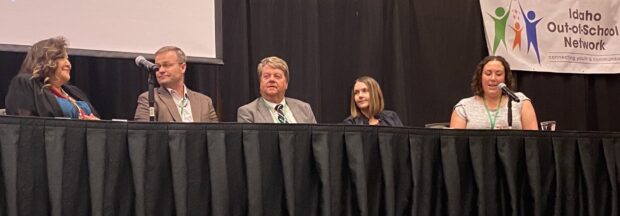In Idaho, barriers to K-12 education abound – including learning loss, mental health issues, and youth suicide.
After-school programs are one way to blast through those barriers.
On Friday, education leaders discussed how after-school programs throughout the state can bolster students’ academic success, confidence, and sense of belonging. They are not a fix-all solution to all that ails Idaho’s youth, but they do provide a way to move forward.
The panel was part of a two-day Idaho Out-of-School Network conference that was held on the Fort Hall Reservation. Nontraditional after-school and summer program educators from across the state convened to explore the best ways to help Idaho’s children, especially in the wake of the pandemic.

“All of us are concerned about the wellbeing of kids,” Emily Allen, a policy associate for Idaho Voices for Children, said. “We always see tremendous resilience in kids, but some of us are getting tired of demanding (that) from kids.”
Pocatello Mayor Brian Blad said that listening to kids and validating their struggles needs to be a priority.
“(Many of us) grew up in a time when if we were feeling anxious or depressed, we were taught to get up and throw some dirt on it and move on; we dodged and shunned away from mental health issues and we can’t do that anymore,” Blad said. “We need to be willing to talk to our youth and not shy away from it.”
Blad pointed out that September is Suicide Awareness Month and discussed a mental health awareness run that his Youth Council organized a few months ago.
Former legislator Britt Raybould – a current candidate for a District 34 House seat – lamented Idaho’s shortage of mental health professionals, which has resulted in months-long wait times for appointments.
“That is unacceptable,” she said. “We’re put in a position where we’re holding things together with spit and duct tape.”
There needs to be an increased focus on recruitment and retention, she said.
Learning loss has been another hurdle.
“A lot of our students were behind to begin with, and for Native American students across the state it got worse since the pandemic. Some have dropped out,” Jessica James, the Tribal Education Program Manager for the Shoshone-Bannock Tribes, said.
On the Fort Hall Reservation, the lack of broadband internet kept students from accessing remote work during the pandemic.
“It was just a big problem,” she said.
Mental health and learning loss are heavy topics worth attention, but American Falls School District Superintendent Randy Jensen said that’s all the more reason to make sure kids are having fun.
“We need to spend more time laughing,” he said. “Academics are really important, but so is spending time together, interacting together, and having fun.”
Jensen has tried to facilitate just that by hosting parent engagement activities like game nights. Many after-school programs also incorporate sports, games, exercise, and time spent outside.
“One of the areas we have a real need to serve in our community is providing our kids opportunities they wouldn’t normally get, like dance, tae kwon do, art, or music,” he said.
After-school programs also provide a safe haven for kids whose parents work long hours.
In the American Falls community, many parents work 10-14 hour shifts, so they might be getting home as late as 9 p.m. Jensen said he brings after-school program information to employers like Lamb Weston and Driscoll Brothers to distribute so parents know about the available resources.
On the reservation, James said the after-school program provides snacks, recreational activities, homework time, and extra support in math and reading.
“It makes a tremendous difference in their scores when they go back to school,” she said. “The indicators show proof that it’s working.”
And there are a number of new educational opportunities popping up for Shoshone-Bannock youth this year:
- A bookmobile, funded with a grant from the Idaho Commission For Libraries, will be arriving this winter.
- The College of Eastern Idaho plans to offer presidential scholarships to Native American students.
- A Boys and Girls Club opened its doors this fall.
After-school programs are not a “silver bullet,” Jensen said, but they do help.
“After school programs are helping youth reach their full potential,” Anna Almerico, the program director for the Idaho Out-of-School Network, said. “They give working parents peace of mind, and they support the wellbeing of the community.”
